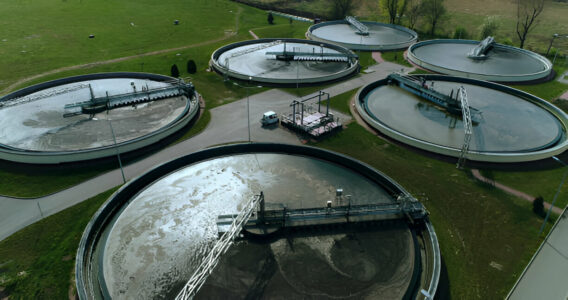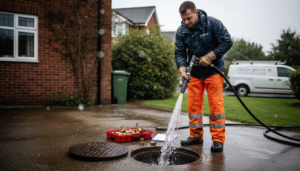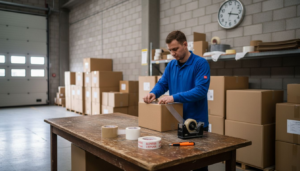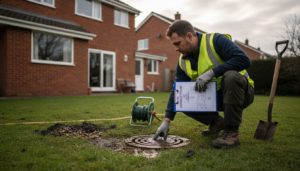Nobody likes dealing with smelly drains outside their home. It’s not just unpleasant; it can also be a sign of bigger plumbing issues. But don’t worry, keeping your drains fresh and clean is easier than you might think. In this article, we’ll dive into everything you need to know about smelly drains, from causes to solutions and preventative measures. Let’s get started!
Understanding the Problem
What Causes Smelly Drains?
Before you can fix a problem, you need to understand what’s causing it. There are a few common culprits when it comes to smelly drains:
Organic Material Build-up
Leaves, food scraps, and other organic materials can accumulate in your drains. Over time, these materials decompose, producing a foul odor.
Blockages
Blockages in the drain can trap water and organic materials, creating a breeding ground for bacteria and bad smells.
Poor Ventilation
Poorly ventilated drains can cause odors to linger. Proper airflow is crucial for keeping your drains fresh.
How to Identify a Smelly Drain Issue
It might seem obvious, but sometimes the source of a smell can be elusive. Check your drains regularly for signs of build-up or blockages. If the smell is persistent, it’s time to take action.
Preventative Measures
Regular Cleaning Routine
One of the best ways to keep your drains odor-free is to establish a regular cleaning routine. This doesn’t have to be complicated – even simple, regular maintenance can make a big difference.
Using Drain Covers
Drain covers can prevent larger debris from entering your drains and causing blockages. They’re an easy and affordable way to keep your drains clear.
Avoiding Disposal of Certain Materials
Be mindful of what you put down your drains. Avoid disposing of grease, coffee grounds, and large food particles, as these can contribute to build-up and blockages.
DIY Solutions for Smelly Drains
Natural Remedies
If you prefer a natural approach, there are several household items you can use to clean your drains.
Baking Soda and Vinegar
A classic solution, baking soda and vinegar can help break down build-up and neutralize odors. Pour half a cup of baking soda down the drain, followed by half a cup of vinegar. Let it sit for an hour, then flush with hot water.
Boiling Water
Sometimes, a good flush with boiling water is all it takes to clear minor blockages and eliminate odors.
Over-the-Counter Solutions
If natural remedies aren’t cutting it, there are plenty of commercial products designed to clean and freshen your drains.
Chemical Drain Cleaners
Chemical drain cleaners can be effective, but use them sparingly. Overuse can damage your pipes and harm the environment.
Enzyme Cleaners
Enzyme cleaners are a gentler option. They use natural enzymes to break down organic material without the harsh chemicals.
Professional Help
When to Call a Plumber
If your DIY efforts aren’t working, it might be time to call in a professional. Persistent odors or frequent blockages can indicate a more serious issue.
Services Offered by Professionals
Plumbers can offer a range of services, from thorough cleanings to more extensive repairs. They can also provide advice on how to maintain your drains.
Costs and Benefits of Professional Services
While professional services can be costly, they can save you time and prevent bigger issues down the road. Weigh the costs against the benefits to decide if it’s the right choice for you.
Environmental Impact
Eco-friendly Cleaning Solutions
Whenever possible, opt for eco-friendly cleaning solutions. They are better for your pipes and the environment.
Reducing Chemical Use
Limit your use of chemical cleaners. Not only are they harsh on your pipes, but they can also have negative environmental impacts.
Case Studies and Real-Life Examples
Common Scenarios
To give you a better idea of what to expect, here are a few common scenarios where homeowners have dealt with smelly drains.
Successful Resolutions
Learn from others’ successes. These case studies show how simple solutions can effectively resolve smelly drain issues.
How do I stop my outside drain from smelling?
A smelly outside drain can be a nuisance, but there are several steps you can take to address the issue:
- Clean the Drain:
- Remove any debris, leaves, or dirt from the drain cover.
- Use a drain snake or a similar tool to remove any blockages or build-up inside the drain.
- Flush the Drain:
- Pour hot water down the drain to help break up any grease or organic matter.
- You can also use a mixture of baking soda and vinegar. Pour half a cup of baking soda down the drain, followed by half a cup of vinegar. Let it sit for about 15-30 minutes, then flush with hot water.
- Use a Drain Cleaner:
- If the smell persists, use a commercial drain cleaner. Follow the instructions carefully, as these products can be harsh and should be handled with care.
- Check for Proper Ventilation:
- Ensure that the drain is properly ventilated. Poor ventilation can cause odors to become trapped and linger.
- Seal Gaps and Cracks:
- Inspect the area around the drain for any gaps or cracks that might allow odors to escape. Seal any openings with appropriate materials like caulk or sealant.
- Regular Maintenance:
- Regularly clean and maintain your outside drain to prevent build-up and odors from returning.
- Professional Help:
- If the smell persists despite your efforts, consider contacting a professional plumber to inspect the drain for any underlying issues that might require more extensive repairs.
Taking these steps should help eliminate or significantly reduce the smell from your outside drain.
FAQs About Smelly Drains
Can Smelly Drains Be Harmful?
Smelly drains can sometimes indicate a more serious problem, such as a blockage or sewer issue. It’s best to address the problem promptly to avoid potential health hazards.
How Often Should I Clean My Drains?
Aim to clean your drains every few months to prevent build-up and odors. More frequent cleaning may be necessary if you notice persistent issues.
What are the Best Products for Drain Maintenance?
Look for enzyme-based cleaners for regular maintenance. For tougher blockages, a chemical cleaner may be necessary, but use them sparingly.
Are There Any Long-term Solutions?
Regular maintenance and mindful disposal habits can go a long way in preventing smelly drains. Consider installing drain covers and using natural cleaning solutions to keep your drains in good condition.
How Can I Improve Drain Ventilation?
Ensure your drains are properly ventilated by checking the vent pipes for blockages. If you’re unsure, a professional plumber can assess and improve your drainage system’s ventilation.
Conclusion!!
Keeping your drains fresh and odor-free doesn’t have to be a daunting task. With a little regular maintenance and some simple preventative measures, you can keep smelly drains at bay. Remember, if DIY solutions don’t work, don’t hesitate to call in a professional. A little investment in your drains today can save you from bigger headaches down the line.




